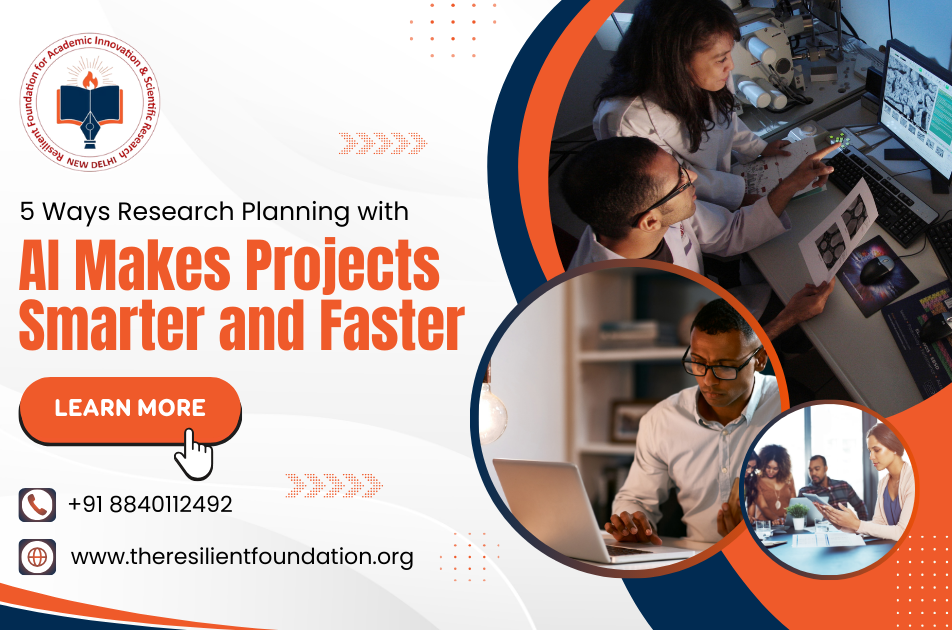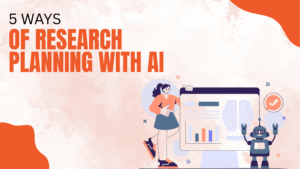An idea starts every project, but success comes from shaping and executing it well. Today, technology is reshaping how we plan research. By using research planning with AI, teams can move faster, make better decisions, and avoid common mistakes. This new approach is helping organizations of every size design smarter projects that save both time and resources.
5 Ways of Research Planning with AI
Artificial intelligence is not just about automation—it’s about making smarter choices. When it comes to research, AI supports teams by improving accuracy, cutting down on errors, and predicting outcomes. Here, we’ll look at five clear ways AI changes research planning and why using it is no longer optional but necessary for success.
AI Speeds Up Data Collection and Analysis
In every project, collecting data is the first big challenge. Without accurate and quick information, projects often slow down. This is where AI steps in with research data analysis tools that transform the way data is handled:
- Quick data sorting: AI can scan huge amounts of information in seconds.
- Pattern detection: It highlights links and insights humans might miss.
- Automatic updates: AI tools keep data fresh without manual work.
- Error reduction: Automated systems reduce mistakes in calculations.
Because of that, teams can spend less time stuck in spreadsheets and more time building ideas. If you’re developing a research plan, having AI handle data analysis means your project always starts on a solid base.
AI Improves Accuracy in Project Research
Speed is helpful, but accuracy is even more important. A project built on wrong information can waste months of work. With AI, accuracy in research and development becomes easier to achieve:
- Real-time validation: AI tools instantly double-check facts.
- Cross-source comparison: Systems compare multiple databases for stronger reliability.
- Error detection: Mistakes in numbers or entries are flagged right away.
- Detailed insights: AI highlights trends that match project goals.
If the data is not accurate, even the best project will fail. But with AI, every piece of information is reviewed with care. This makes analytical research not only faster but also more reliable for decision-making.
AI Helps in Predicting Project Outcomes
Every organization wants to know: will this project succeed? While no one can predict the future perfectly, AI makes forecasting smarter. Because AI studies past and present data, it gives teams clearer expectations. Here’s how it helps in developing a research plan:
- Risk assessment: AI shows where projects may face challenges.
- Timeline forecasting: It estimates how long different tasks might take.
- Budget prediction: Costs are tracked, helping avoid overspending.
- Outcome mapping: AI shows possible results based on similar projects.
Therefore, decision-makers don’t have to guess anymore. Instead, they get a clearer picture of what to expect, allowing smarter planning and reduced risk.
AI Supports Collaboration and Team Planning
Projects often fail not because of poor ideas, but because teams don’t work well together. Collaboration is key, and AI makes this smoother. When teams attend a research workshop, AI-based platforms provide a shared space for planning:
- Shared dashboards: Everyone can see the same progress updates.
- Task allocation: AI assigns work based on team strengths.
- Communication support: Tools help teams stay connected in real time.
- Conflict resolution: AI suggests ways to manage overlapping tasks.
If everyone is on the same page, projects move faster. Also, team members can focus more on creating solutions instead of worrying about miscommunication. With research planning with AI, collaboration becomes stronger, smarter, and more efficient.
AI Personalizes Research Planning for Each Project
Not all projects are the same. What works for one team may not work for another. This is why personalization matters, and AI is a turning point here. For organizations like Resilient Foundation, personalization ensures that every project plan is designed to meet its unique needs:
- Customized timelines: AI builds schedules suited to project goals.
- Resource matching: Tools assign the right resources to the right tasks.
- Adaptive strategies: AI adjusts plans when unexpected challenges come up.
- Learning-based improvements: With every project, AI learns and offers better suggestions next time.
Because of that, planning becomes more flexible and practical. If you are part of a team working on social initiatives or innovation projects, Resilient Foundation ensures that AI-driven tools are used to design effective plans. This not only saves time but also improves project quality, proving that research planning with AI is the way forward.


